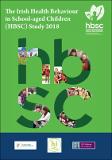| dc.contributor.author | Költő, András | |
| dc.contributor.author | Gavin, Aoife | |
| dc.contributor.author | Molcho, Michal | |
| dc.contributor.author | Kelly, Colette | |
| dc.contributor.author | Walker, Larri | |
| dc.contributor.author | Nic Gabhainn, Saoirse | |
| dc.date.accessioned | 2020-01-07T13:38:38Z | |
| dc.date.available | 2020-01-07T13:38:38Z | |
| dc.date.issued | 2020-01-09 | |
| dc.identifier.citation | Költő, András, Gavin, Aoife, Molcho, Michal, Kelly, Colette, Walker, Larri, & Nic Gabhainn, Saoirse. (2020). The Irish Health Behaviour in School-aged Children (HBSC) Study 2018: NUI Galway. | |
| dc.identifier.isbn | 978-1-908358-69-1 | |
| dc.identifier.uri | http://hdl.handle.net/10379/15675 | |
| dc.description.abstract | This report presents data from the Health Behaviour in School-aged Children (HBSC) survey carried
out in 2018 in the Republic of Ireland. This is the sixth time that data of this kind have been collected
from young people across the Republic of Ireland; previous surveys were conducted in 2014, 2010,
2006, 2002 and 1998 (www.nuigalway.ie/hbsc).
HBSC is a cross-sectional research study conducted in collaboration with the World Health
Organization (WHO) Regional Office for Europe. The HBSC international survey runs on an
academic four year cycle and in 2017/2018 there were 47 participating countries and regions
(see www.hbsc.org). The overall study aims to gain new insight into and increase our understanding of
young people’s health and wellbeing, health behaviours and their social context. As well as serving a
monitoring and a knowledge-generating function, one of the key objectives of HBSC has been to
inform policy and practice.
Cross-nationally, HBSC collects information on the key indicators of health behaviour and health
outcomes as well as the context of health for young people. HBSC is a school-based survey with data
collected through self-completion questionnaires administered by teachers in the classroom. The
international HBSC survey instrument is a standard questionnaire developed by the international
research network.
The areas of interest are chosen in collaboration with the WHO and are designed to help assist
developments at a national and international level in relation to youth health. National items relevant
to current issues for children in Ireland are also included in the Irish HBSC survey. The topics
identified for inclusion in this first report from the 2018 Irish survey are similar to those included in
the 2014 national HBSC report. They were identified by the HBSC Advisory Board and are drawn
from key national strategy documents including Healthy Ireland1
. These include general health,
smoking, use of alcohol and other substances, food and dietary behaviour, exercise and physical
activity, self-care, injuries, bullying including traditional and cyberbullying, and sexual health
behaviours. New questions in 2018 include those on alcohol availability. Children who had ever
consumed alcohol were asked how they sourced that alcohol and where they consumed it. This report
also includes summary findings from two measures of mental health included for the first time in the
2018 survey. All results are presented by gender, age and social class groups and statistically significant
differences across these groups are highlighted in this report. | |
| dc.description.sponsorship | The HBSC study was funded by the Department of Health. | |
| dc.publisher | NUI Galway | en_IE |
| dc.rights | Attribution-NonCommercial-NoDerivs 3.0 Ireland | |
| dc.rights.uri | https://creativecommons.org/licenses/by-nc-nd/3.0/ie/ | |
| dc.subject | Health Promotion | en_IE |
| dc.subject | Children | |
| dc.subject | Health behaviour | |
| dc.title | The Irish Health Behaviour in School-aged Children (HBSC) Study 2018 | en_IE |
| dc.type | Report | en_IE |
| dc.identifier.doi | 10.13025/zvwm-rp65 | |
| dc.local.publishedsource | https://doi.org/10.13025/zvwm-rp65 | |
| dc.description.peer-reviewed | peer-reviewed | en_IE |
| dc.contributor.funder | Department of Health, Ireland | |
| nui.item.downloads | 442 | |


